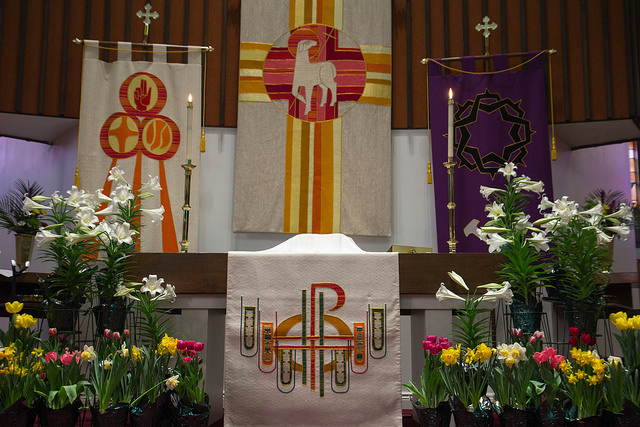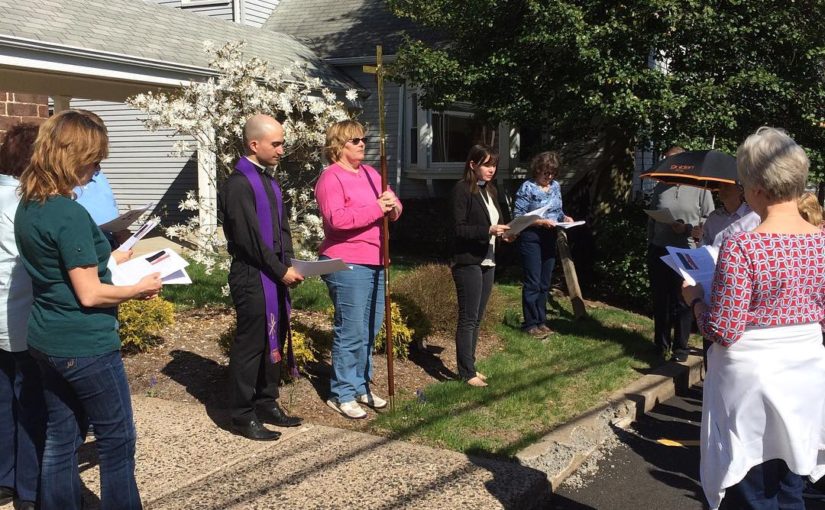Now before the festival of the Passover, Jesus knew that his hour had come to depart from this world and go to the Father. Having loved his own who were in the world, he loved them to the end. The devil had already put it into the heart of Judas son of Simon Iscariot to betray him. And during supper Jesus, knowing that the Father had given all things into his hands, and that he had come from God and was going to God, got up from the table, took off his outer robe, and tied a towel around himself. Then he poured water into a basin and began to wash the disciples’ feet and to wipe them with the towel that was tied around him. He came to Simon Peter, who said to him, “Lord, are you going to wash my feet?” Jesus answered, “You do not know now what I am doing, but later you will understand.” Peter said to him, “You will never wash my feet.” Jesus answered, “Unless I wash you, you have no share with me.” Simon Peter said to him, “Lord, not my feet only but also my hands and my head!” Jesus said to him, “One who has bathed does not need to wash, except for the feet, but is entirely clean. And you are clean, though not all of you.” For he knew who was to betray him; for this reason he said, “Not all of you are clean.” After he had washed their feet, had put on his robe, and had returned to the table, he said to them, “Do you know what I have done to you? You call me Teacher and Lord—and you are right, for that is what I am. So if I, your Lord and Teacher, have washed your feet, you also ought to wash one another’s feet. For I have set you an example, that you also should do as I have done to you. Very truly, I tell you, servants are not greater than their master, nor are messengers greater than the one who sent them. If you know these things, you are blessed if you do them.
Jesus said, “Now the Son of Man has been glorified, and God has been glorified in him. If God has been glorified in him, God will also glorify him in himself and will glorify him at once. Little children, I am with you only a little longer. You will look for me; and as I said to the Jews so now I say to you, ‘Where I am going, you cannot come.’ I give you a new commandment, that you love one another. Just as I have loved you, you also should love one another. By this everyone will know that you are my disciples, if you have love for one another.”
John 13:1-17,31b-35
My sermon from Maundy Thursday (April 13, 2017) on John 13:1-17,31b-35. Listen to the recording at the bottom of the page or read my manuscript below:
One of the nice things about having cats again is that, when I’m eating, I’m never really alone. When I pull out a chair and take a seat at the dining room table, I notice the tips of cat ears sitting patiently on the other side. Pretty soon, there’s a cat on the table, hoping that today will be the day when I let him drink all the milk in my cereal bowl. It’s adorable and annoying, especially when they try to grab the spoon right out of my hand. Cats and dogs, are some of the most persistent, patient, and fuzzy dining companions we get to have. And even when we think we’re alone, we’re not. They’re there, lying in wait under an ottoman, or a chair, or the table itself. These hidden companions are part of the story that unfolds when we sit for a meal. And if we forget that they are there, we risk having our lunch swiped from us when we’re not paying attention.
Paying attention to our hidden companions isn’t just something to do at dinner; it’s important for tonight’s reading from John as well. These verses from John 13 are heard every Maundy Thursday. And they make us uncomfortable because Jesus does a really strange thing: he washes feet. And even if we don’t know why foot washing was a thing in the ancient world, there’s something inside us that knows that foot washing is just – weird. In the words of one of our high school youth at our youth group meeting last Sunday, foot washing is… “Gross.” Feet are in shoes all day long. They get dry and cracked. They literally carry us around, and we barely think about them, until they stop working the way we expect. Feet are also beneath us. When we look down, there they are. So when Jesus gets up, removes his clothing, wraps a towel around his waist, and kneels at the feet of his students – he, the Master, the Teacher, the one who was there before the world was, is suddenly beneath them. He’s below. He’s serving the ones who are called to serve him. And when we imagine what footwashing actually was like in ancient Jerusalem – a city without indoor plumbing, or paved streets, or people owning closed-toed shoes – gross doesn’t even come close to describe it. The one usually assigned to wash feet would be a slave or a servant. A teacher shouldn’t be a footwasher. And yet…here is Jesus…being gross.
So if our feet are washed, what does that bring? I mean, it feels nice when our feet are in good shape and look good but Jesus is doing more than giving his disciples pedicures. We need to pay attention to the hidden companions, the hidden verses, that accompany this text. And those verses are…everywhere. They show up in the very first verse, in the word “hour.” That one word pushes us back to the start of Jesus’ ministry in John, when he is at a wedding and the party is about to end prematurely because the wine has run out. Jesus’ mom informs Jesus and he says “my hour has not yet come.” So he makes some wine out of water. It’s a wedding party full of food and drink that starts Jesus’ journey. And it’s tonight, when his hour finally comes, that his ending begins with a dinner party. The foot washing is more than one act of service we’re asked to replicate and ritualize. The foot washing, in the words of Rev. Karoline Lewis in her commentary on John, “is somewhat of a microcosm of God becoming flesh, God dwelling with us, now no greater than we are” (page 181). When Jesus washed his disciples’ feet, he summarized his entire ministry. The foot washing is a capstone to the life that Jesus lived. It completes his narrative, this part of his story, and becomes“a pattern of being….that the disciples will now need to take on” (page 181).
And this pattern of being is hard. There are moments when we’re asked to love those we don’t even like. There are moments when we are asked to serve people we do not understand and people we don’t want to even try to understand. The life of love Jesus embodies upends our expectations of what’s normal. Even if we hear the call to serve all people like Jesus did, there are still some people we don’t want to love. There are some we don’t think deserve to be loved. And that’s why Love is hard; love is difficult; because love messes with our expectations and reveals to us what God really wants us to see.
And there’s another hidden companion to tonight’s text that we need to see. We need to hear what happens to that evil, hidden in the room and explicitly declared in verse 2. Among the disciples, sitting in the room, is Judas. He watches as Jesus washes their feet. He feels the water that Jesus pours over his toes. His feet are dried by his teacher, his friend, and his rabbi. And, in verses we do not hear tonight, after all of that, Judas leaves. He heads out, into the night. Now, Jesus knew Judas will do this. He knew his hour had finally arrived. And yet…Jesus still served. He still washed. He still loved everyone, including the one who will deny him, the one who will betray him, and the ones who will run away when the cross finally comes.
The hidden companion to Jesus’ command to “love one another” is Judas. In the act of footwashing, the disciples are confronted with the entirety of Jesus’ story. For some, that sparked confusion. For others, hope. And for Judas…well…he left. In front of the entire group, he just walked out. The fear and tension and confusion around that dinner table must have been palpable. And it’s in the middle of all of that when Jesus said “love one another.” Love. In the face of betrayal, in the face of fear, in the face of uncertainty and our unrealized expectations, just love. Jesus doesn’t tell his followers to be a hidden companion in a world that doesn’t always know him. He tells them to love like he did, in all the different ways he modeled throughout his ministry and in the many other ways God will inspire them to see. Foot washing was just the capstone to the story of love Jesus lived out. And as he served, so should we, being visible companions to each other, to our neighbors, and to the One God sent to upend the world through love.
Amen.
Podcast: Play in new window | Download



